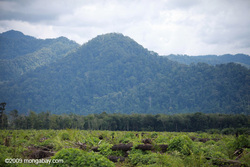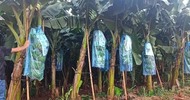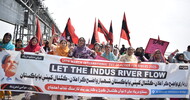Mongabay | 15 October 2013

Local groups have called on the governor of Jambi province to cancel PT Asiatic Persada’s permit after Wilmar’s sale of the company stalls IFC-mediated talks. Above, Google Earth image of Pinang Tinggi, Jambi, Sumatra.
Palm oil deal undermines efforts to resolve 25-year conflict in Sumatra
Diana Parker, Mongabay-Indonesia correspondent
The call for government intervention comes just months after palm oil giant Wilmar, PT Asiatic Persada’s former parent company, sold the unit, effectively halting the latest mediation attempt with the affected communities, which was being facilitated by the International Finance Corporation (IFC), the private-sector arm of the World Bank.
Wilmar, which took over the company in 2006, received financing from the IFC, which requires borrowers to meet performance standards in their operations designed to prevent rights abuses and minimize the risk that investments will harm local communities and the environment.
Members of indigenous Suku Anak Dalam communities in Jambi have long complained that PT Asiatic Persada’s concession unlawfully stripped them of their customary land and cut them off from their traditional livelihoods. Under Wilmar, the company has also been accused of destroying the homes of 83 families living in the plantation area in 2011, following a violent clash over allegations that members of the community were stealing palm fruits, which involved police mobile brigade (Brimob) officers contracted by the company.
The IFC’s Compliance Advisory Ombudsman (CAO), after receiving multiple complaints from communities and NGOs regarding the legality of the concession and abuses carried out by the company under Wilmar, eventually stepped in to help mediate talks with local communities in an attempt to finally resolve the dispute.
However, before any resolution could be reached, Wilmar sold PT Asiatic Persada to two companies, Prima Fortune International Ltd and PT Agro Mandiri Semesta (AMS), transferring management to the new buyers in April this year. PT AMS is a unit of the Ganda Group, a business group owned by Ganda Sitorus, the brother of Wilmar founder Martua Sitorus.
The IFC-mediated negotiations that took place under Wilmar also involved the provincial government of Jambi. However, PT Asiatic Persada’s new management has chosen to continue negotiations with a new team from the district government, a move community members and NGOs involved in the case feel undermines the process.
“The governor [of Jambi province] should immediately caution PT Asiatic Persada against neglecting all the negotiations that have already been carried out and the important agreements that have come out of these processes,” Rian Hidayat, deputy director of SETARA Jambi, a local NGO which had been involved in the negotiations, said in a media release last week.
This is not the first time the sale of PT Asiatic Persada has disrupted attempts to resolve conflicts with local communities. The company, which acquired the 20,000-hectare permit in 1986, has changed hands four times since 2000. When Wilmar took control in 2006, it cancelled an earlier plan to grant local communities 1,000 hectares of smallholder plantations, a move that may have contributed to the conflict escalating under Wilmar.
In addition to receiving funding from the IFC, Wilmar is also a member of the Roundtable on Sustainable Palm Oil (RSPO), a voluntary body that requires its members to meet certain social and environmental standards. Wilmar has been accused of violating both IFC and RSPO standards, and complaints have been filed with both organizations regarding PT Asiatic Persada.

Oil palm plantation in Sumatra. Photo by Rhett A. Butler.
Community members and NGOs involved in the case are concerned that selling PT Asiatic Persada to “non-Wilmar, non-RSPO member and non-IFC funded companies” jeopardizes efforts to resolve the conflict as the new owners may not feel obliged to continue the IFC-mediated talks and are not bound by RSPO and IFC standards.
A coalition of NGOs and community members expressed this concern in a joint letter to Wilmar on May 14. In a response to the letter, Wilmar said the buyer was aware of the progress and status of the mediation and that it has encouraged the buyer to continue with the process.
If Wilmar is allowed to simply walk away from the conflict before it is resolved, it also undermines the effectiveness of IFC and RSPO standards, NGOs have said.
“The handover of PT Asiatic Persada to PT AMS by Wilmar without any prior consultation with the communities involved in the JOMET [provincial government joint mediation team]-led mediation towards conflict resolution constitutes a violation of the Principles and Criteria of the Roundtable on Sustainable Palm Oil (RSPO), of which Wilmar is a member, and a violation of the RSPO’s Code of Conduct,” Sophie Chao from the UK-based Forest Peoples Programme said last week.
“If the RSPO does not take immediate action to address this situation and sanction Wilmar for its flagrant act of bad faith and lack of transparency in its sale of PT Asiatic Persada, the very accountability and legitimacy of the RSPO as a mechanism seeking to support the production of genuinely sustainable palm oil, will be jeopardized.”
Correspondence between Wilmar and the NGO coalition, comprised of Forest Peoples Programme, Sawit Watch, SETARA Jambi and a Suku Anak Dalam customary leader:
May 30 response from Wilmar
June 7 follow-up letter to Wilmar from the coalition
July 2 response from Wilmar












